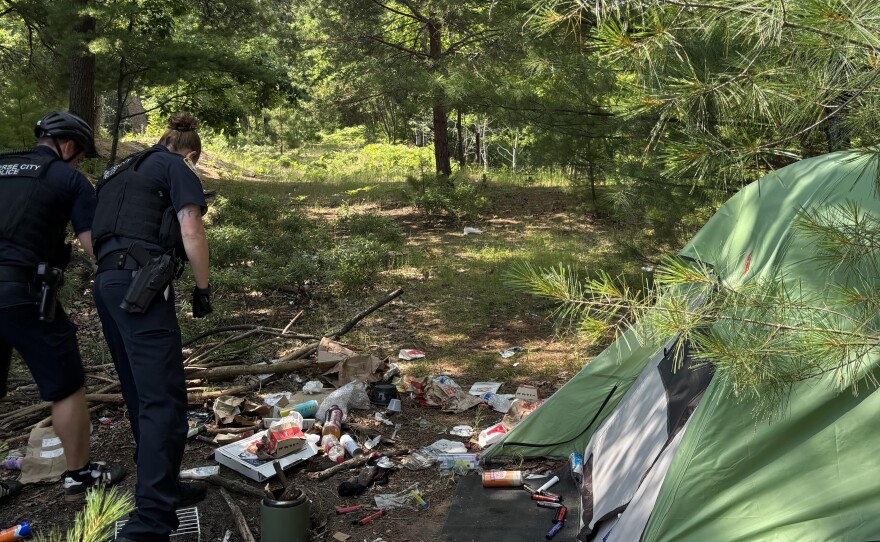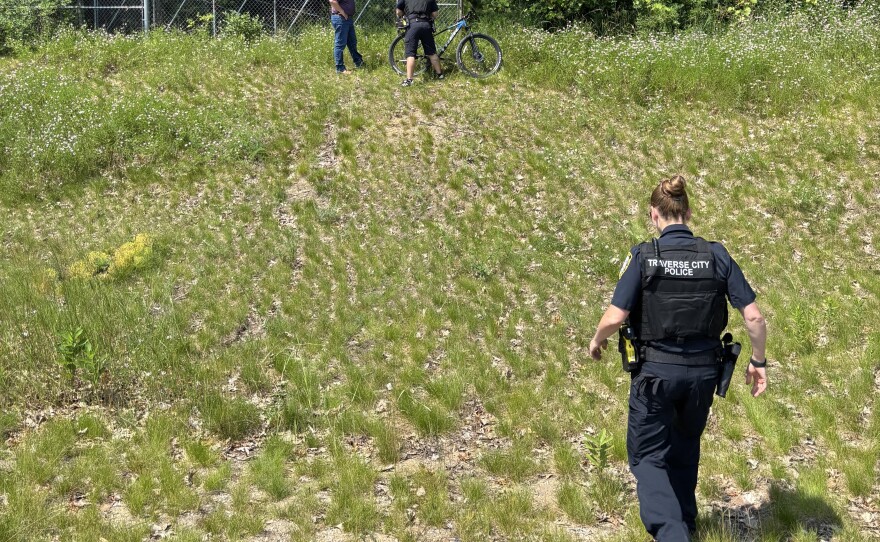It’s a weekday morning in July, and Traverse City Police Officer Krista Fryczynski is at local auto supplier Lear Corporation.
The company called the police about someone camping on their wooded property.
After a short hike with the property manager and another officer, Fryczynski arrives at a zipped-up tent surrounded by piles of trash.
No one was inside the tent, but Fryczynski recognizes names on packages and mail scattered around the site.
“This is normal. This is what I deal with on a daily basis — tents with abandoned trash and who’s gonna clean it up?” she said. “I can give them a ticket, but what’s that gonna (do), you know?”
“If it was city [property], there are more things I can do,” Fryczynski added before the property owner requested an indefinite trespass notice.
This is just one part of Fryczynski’s role as the department’s Community Officer, a position focused on outreach to unsheltered residents in the city.
“I'm a garbage person, a counselor — a lot of things I never thought I would be as a cop,” she said.
As homelessness rises across Michigan, some police departments have rethought their approach with unsheltered people.
A 2023 survey of the 100 largest U.S. cities revealed that police are formally involved in the homeless outreach efforts of 76% of these cities.
In the last five years Detroit, Grand Rapids, Kalamazoo and Traverse City have all added various kinds of community homeless outreach to their police departments. These officers are being tasked with building relationships with people living on the streets.
In June, the Northwest Michigan Coalition to End Homelessness counted 251 people living without shelter in the region. Statewide, last year’s HUD data reported 9,739 people experiencing unsheltered homelessness.
Traverse City is still grappling with the aftermath of clearing a longstanding homeless encampment known as “the Pines,” where many unsheltered residents had lived in tents for extended periods.
And as a result, Fryczynski said she’s receiving more calls about tents appearing in different parts of the city.
“I've created such good relationships with these people. Even if I do have to arrest them, I see them the next day or whatever and we talk about it and we're fine.”OFFICER KRISTA FRYCZYNSKI | Traverse City Police Dept.
On a typical morning, Fryczynski starts at Central Methodist Church, where breakfast is served daily for people in need. One of her first stops included checking in with a man whose bicycle had been stolen to ask whether he wanted to press charges.
While they spoke, the man was cleaning up an area filled with trash left by another group — a task Fryczynski rewarded with a $20 gift card. In her patrol vehicle she regularly handed out garbage bags while requesting people clean up after themselves and others.
Fryczynski is viewed by many in the community as a less confrontational figure among law enforcement.
But even Fryczynski acknowledged the reality is more complicated.
She regularly builds relationships with unhoused individuals, helps them file police reports, and offers support — but also makes arrests, often involving people she knows personally.
“I've created such good relationships with these people,” she said. “Even if I do have to arrest them, I see them the next day or whatever and we talk about it and we're fine. …it's pretty interesting to be in this position and have that relationship — like, ‘Hey, I talk to you every day and the next day I have to arrest you if I have to.'”
Throughout the day, Fryczynski moves between local service organizations, including the emergency shelter Safe Harbor and the Jubilee House day shelter. Along the way, she checks in with people all over the city: a couple living in their car parked outside the library, a quiet man sitting on a bench, a woman she’s worked with for months who just secured permanent housing.
At the end of the shift, Fryczynski reflected on the tension of her role — how the public views her from both sides.
“It's really hard for me on both ends,” she said. “Like I said, I'm talking to these people all day long, I'll be talking to them and then passersby will come up and ask the person if I'm harassing them … and then it's frustrating because I'll get people coming up to me wanting me to move people along because they're sitting at a picnic table.”
Fryczynski said she often finds herself caught in the middle — trying to defend the people she’s helping, while also recognizing why they might act out or cause disruptions, especially when alcohol is involved.
“It's hard to be in that position,” she said.







